|
|
|
Sort Order |
|
|
|
Items / Page
|
|
|
|
|
|
|
| Srl | Item |
| 1 |
ID:
129104
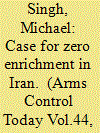

|
|
|
|
|
| Publication |
2014.
|
| Summary/Abstract |
In the debate over sanctions on Iran-their role in bringing Tehran to the negotiating table and their proper place in U.S. diplomatic strategy in the future-scant attention has been paid to a major shift in the negotiating position of the P5+1, the group of six countries (China, France, Germany, Russia, the United Kingdom, and the United States) that is negotiating with Tehran over the Iranian nuclear program. No longer is the P5+1 demanding that Iran halt uranium enrichment. Indeed, in the November 24 first-step nuclear accord, the Joint Plan of Action,[1] the P5+1 all but concedes that Iran will be permitted to enrich in perpetuity. In separate comments that have quickly become conventional wisdom among Iran analysts, U.S. negotiators now characterize their previous position that Iran should halt enrichment as "maximalist."[2] Although undoubtedly expedient, this shift away from a zero-enrichment negotiating position is misguided and unnecessary.[3] The U.S. shift away from zero enrichment to limited enrichment represents a significant diplomatic victory for Iran. For the last decade, the position of the EU-3 (France, Germany, and the UK) and then the P5+1 had been that Iran must "suspend all enrichment-related and reprocessing activities, including research and development." This position was enshrined as an Iranian obligation in a series of UN Security Council resolutions.[4] Iran, however, asserted a "right to enrich" and refused to halt enrichment after resuming it when nuclear talks with the European Union broke down in 2005. This difference formed the core of the confrontation that subsequently developed between Iran and the allies.
|
|
|
|
|
|
|
|
|
|
|
|
|
|
|
|
| 2 |
ID:
121172
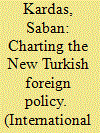

|
|
|
|
|
| Publication |
2012.
|
| Summary/Abstract |
Turkey's foreign policy activism on a range of regional and global issues
has sparked enormous interest in academic and policy circles in recent
years. Turkey occupied a central place in discussions on the Iranian nuclear
program when it formulated, with Brazil, a plan to transfer part of Iran's
nuclear stockpile to Turkey in apparent opposition to the US policy of
spearheading a new round of sanctions in the summer of 2010. Turkey's
attempts to interject itself as a mediator into regional crises-be it between
Israel and the Arabs; Afghanistan and Pakistan; Bosnia-Herzegovina, Serbia,
and Croatia; various Iraqi groups; various Lebanese groups; or Russia and
Georgia-has been another area of activism for Turkish diplomacy. At the
same time, Turkey has initiated dialogue with such neighbours as Armenia,
Greece, and Iraq to resolve decades-old disputes and normalize bilateral
relations. Turkey's efforts to capitalize on its geographic location to turn the
country into a major hub for the transportation and marketing of Eurasian
and Middle Eastern energy resources to global markets has provided yet
another dimension of Turkey's growing visibility in international affairs.
|
|
|
|
|
|
|
|
|
|
|
|
|
|
|
|
| 3 |
ID:
093985
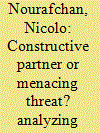

|
|
|
|
|
| Publication |
2010.
|
| Summary/Abstract |
This article examines contrasting paradigms of China's foreign policy in the context of China's role in the Iranian nuclear program. In contrast to revisionist and status quo paradigms, which view China as either a menacing threat or a constructive partner of the United States, this article advances a reformist paradigm that presents China as neither a follower nor an opponent of US policies. Rather, the reformist paradigm suggests that although China has placed a premium on its relations with Washington, it has also pursued stealthily obstructive policies in Iran that have enabled it to garner substantial narrow gains at the expense of compromising the US agenda in the region. The author calls this grand strategy opportunistic pragmatism.
|
|
|
|
|
|
|
|
|
|
|
|
|
|
|
|
| 4 |
ID:
100590
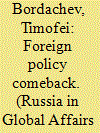

|
|
|
| 5 |
ID:
112958
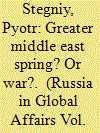

|
|
|
|
|
| Publication |
2012.
|
| Summary/Abstract |
The tight knot of contradictions surrounding the Iranian nuclear program and Tehran's policy in general has affected so profound international policies that any attempt to cut it may blow up peace already in the short term, and not only in the Greater Middle East.
|
|
|
|
|
|
|
|
|
|
|
|
|
|
|
|
| 6 |
ID:
121700
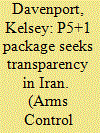

|
|
|
|
|
| Publication |
2013.
|
| Summary/Abstract |
The proposal six world powers brought to the April 5-6 talks with Iran over its controversial nuclear program contains transparency measures, including provisions that would require Iran to give inspectors increased access to facilities and provide information to address allegations of possible activities related to making a nuclear bomb, according to a former Iranian nuclear negotiator and two Western diplomats.
|
|
|
|
|
|
|
|
|
|
|
|
|
|
|
|
| 7 |
ID:
124796
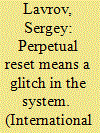

|
|
|
|
|
| Publication |
2013.
|
| Summary/Abstract |
Minister of Foreign Affairs of the Russian Federation
GOOD AFTERNOON, ladies and gentlemen.
I am glad to welcome you to this traditional meeting, to sum up the year 2012 in foreign policy.
Last year was difficult. Uneven global development intensified, instability increased, the Middle East was seething. Of greatest worry is the development of the situation in and around Syria. Terrorist attacks have become almost daily occurrences in the region, weapons have spread unchecked, there is infiltration of militants, including into the Sahara-Sahel zone. The situation in Mali feels the impact of the events in Libya. A very alarming wake-up call was the seizure of hostages in Algeria. Little progress was made towards a solution of the task of non-proliferation of mass destruction weapons - I have in mind the situation around the Iranian nuclear program (INP), the nuclear issue on the Korean Peninsula, and the situation with the convening of the conference to establish a Middle East zone free of weapons of mass destruction.
|
|
|
|
|
|
|
|
|
|
|
|
|
|
|
|
| 8 |
ID:
121971
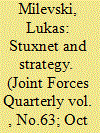

|
|
|
| 9 |
ID:
102408
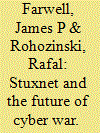

|
|
|
|
|
| Publication |
2011.
|
| Summary/Abstract |
The discovery in June 2010 that a cyber worm dubbed 'Stuxnet' had struck the Iranian nuclear facility at Natanz suggested that, for cyber war, the future is now. Stuxnet has apparently infected over 60,000 computers, more than half of them in Iran; other countries affected include India, Indonesia, China, Azerbaijan, South Korea, Malaysia, the United States, the United Kingdom, Australia, Finland and Germany. The virus continues to spread and infect computer systems via the Internet, although its power to do damage is now limited by the availability of effective antidotes, and a built-in expiration date of 24 June 2012.
|
|
|
|
|
|
|
|
|
|
|
|
|
|
|
|
| 10 |
ID:
112113
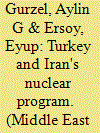

|
|
|
| 11 |
ID:
129879
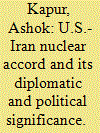

|
|
|
| 12 |
ID:
115610
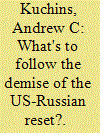

|
|
|
|
|
|
|
|